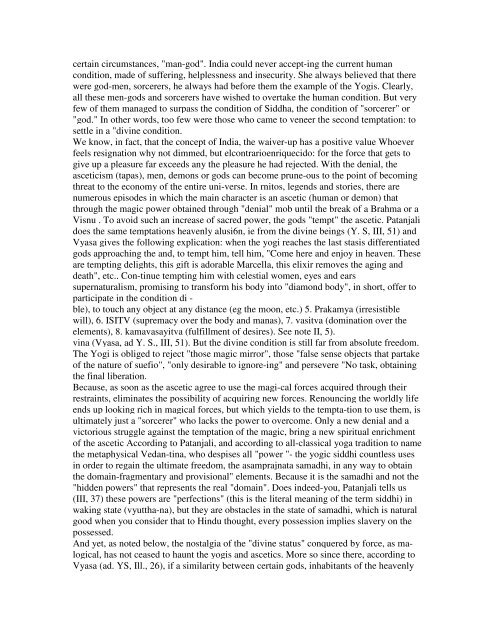Mircea Eliade YOGA IMMORTALITY AND ... - Brihaspati.net
Mircea Eliade YOGA IMMORTALITY AND ... - Brihaspati.net
Mircea Eliade YOGA IMMORTALITY AND ... - Brihaspati.net
You also want an ePaper? Increase the reach of your titles
YUMPU automatically turns print PDFs into web optimized ePapers that Google loves.
certain circumstances, "man-god". India could never accept-ing the current human<br />
condition, made of suffering, helplessness and insecurity. She always believed that there<br />
were god-men, sorcerers, he always had before them the example of the Yogis. Clearly,<br />
all these men-gods and sorcerers have wished to overtake the human condition. But very<br />
few of them managed to surpass the condition of Siddha, the condition of "sorcerer" or<br />
"god." In other words, too few were those who came to veneer the second temptation: to<br />
settle in a "divine condition.<br />
We know, in fact, that the concept of India, the waiver-up has a positive value Whoever<br />
feels resignation why not dimmed, but elcontrarioenriquecido: for the force that gets to<br />
give up a pleasure far exceeds any the pleasure he had rejected. With the denial, the<br />
asceticism (tapas), men, demons or gods can become prune-ous to the point of becoming<br />
threat to the economy of the entire uni-verse. In rnitos, legends and stories, there are<br />
numerous episodes in which the main character is an ascetic (human or demon) that<br />
through the magic power obtained through "denial" mob until the break of a Brahma or a<br />
Visnu . To avoid such an increase of sacred power, the gods "tempt" the ascetic. Patanjali<br />
does the same temptations heavenly alusi6n, ie from the divine beings (Y. S, III, 51) and<br />
Vyasa gives the following explication: when the yogi reaches the last stasis differentiated<br />
gods approaching the and, to tempt him, tell him, "Come here and enjoy in heaven. These<br />
are tempting delights, this gift is adorable Marcella, this elixir removes the aging and<br />
death", etc.. Con-tinue tempting him with celestial women, eyes and ears<br />
supernaturalism, promising to transform his body into "diamond body", in short, offer to<br />
participate in the condition di -<br />
ble), to touch any object at any distance (eg the moon, etc.) 5. Prakamya (irresistible<br />
will), 6. ISITV (supremacy over the body and manas), 7. vasitva (domination over the<br />
elements), 8. kamavasayitva (fulfillment of desires). See note II, 5).<br />
vina (Vyasa, ad Y. S., III, 51). But the divine condition is still far from absolute freedom.<br />
The Yogi is obliged to reject "those magic mirror", those "false sense objects that partake<br />
of the nature of suefio", "only desirable to ignore-ing" and persevere "No task, obtaining<br />
the final liberation.<br />
Because, as soon as the ascetic agree to use the magi-cal forces acquired through their<br />
restraints, eliminates the possibility of acquiring new forces. Renouncing the worldly life<br />
ends up looking rich in magical forces, but which yields to the tempta-tion to use them, is<br />
ultimately just a "sorcerer" who lacks the power to overcome. Only a new denial and a<br />
victorious struggle against the temptation of the magic, bring a new spiritual enrichment<br />
of the ascetic According to Patanjali, and according to all-classical yoga tradition to name<br />
the metaphysical Vedan-tina, who despises all "power "- the yogic siddhi countless uses<br />
in order to regain the ultimate freedom, the asamprajnata samadhi, in any way to obtain<br />
the domain-fragmentary and provisional" elements. Because it is the samadhi and not the<br />
"hidden powers" that represents the real "domain". Does indeed-you, Patanjali tells us<br />
(III, 37) these powers are "perfections" (this is the literal meaning of the term siddhi) in<br />
waking state (vyuttha-na), but they are obstacles in the state of samadhi, which is natural<br />
good when you consider that to Hindu thought, every possession implies slavery on the<br />
possessed.<br />
And yet, as noted below, the nostalgia of the "divine status" conquered by force, as malogical,<br />
has not ceased to haunt the yogis and ascetics. More so since there, according to<br />
Vyasa (ad. YS, Ill., 26), if a similarity between certain gods, inhabitants of the heavenly







